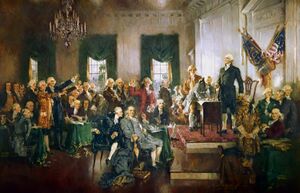Many thanks to our Patrons who cover ~2/3 of our hosting bill. Please join them if you can.
1787
Jump to navigation
Jump to search
1777 < 1778 < 1779 < 1780 < 1781 < 1782 < 1783 <1784 < 1785 < 1786 < 1787 > 1788 > 1789 > 1790 > 1791 > 1792 > 1793 > 1794 > 1795 > 1796 > 1797
 September 17: The United States Constitution is signed in Philadelphia. | |
| year 1787 |
Contents
Events
January–March
- February 4 – Shays' Rebellion in Massachusetts fails.
- March 17 – The Bank of North America, the central bank of the United States government under the Articles of Confederation, is re-incorporated after its charter had expired in 1786.
- March 28 – In the British House of Commons, Henry Beaufoy files the first motion to repeal the Test Act 1673, which restricts the rights of non-members of the Church of England.;[1] Beaufoy's motion is rejected, and the Act is not repealed until 1829.
- March 30 – Biblical theology becomes a separate discipline from biblical studies, as Johann Philipp Gabler delivers his speech "On the proper distinction between biblical and dogmatic theology and the specific objectives of each" upon his inauguration as the professor of theology at the University of Altdorf in Germany.[2]
April–June
- April 2 – A Charter of Justice is signed, providing the authority for the establishment of the first New South Wales (i.e. Australian) Courts of Criminal and Civil Jurisdiction.
- May 7 – The New Church is founded.
- May 13 – Captain Arthur Phillip leaves Portsmouth, England with the 11 ships of the First Fleet, carrying around 700 convicts and at least 300 crew and guards, to establish a penal colony in Australia.
- May 22 – In Britain, Thomas Clarkson and Granville Sharp found the Society for Effecting the Abolition of the Slave Trade, with support from John Wesley, Josiah Wedgwood and others.
- May 25 – In Philadelphia, delegates begin to convene the Constitutional Convention, intended to amend the Articles of Confederation (however, a new United States Constitution is eventually produced). George Washington presides over the Convention.
- May – Orangist troops attack Vreeswijk, Harmelen and Maarssen; civil war starts in the Dutch Republic.
- June 20 – Oliver Ellsworth moves at the Federal Convention that the government be called the United States.
- June 28 – Princess Wilhelmina of Orange, sister of King Frederick William II of Prussia, is captured by Dutch Republican patriots, taken to Goejanverwellesluis and not allowed to travel to The Hague.
July–September
- July 13 – The Congress of the Confederation enacts the Northwest Ordinance, establishing governing rules for the Northwest Territory (the future states of Ohio, Indiana, Illinois, Michigan and Wisconsin). It also establishes procedures for the admission of new states, and limits the expansion of slavery.
- July 18 – The United States ratifies its first treaty with the Sultanate of Morocco.
- August 27 – Launching a 45-foot (14 m) steam powered craft on the Delaware River, John Fitch demonstrates the first U.S. patent for his design.
- September 13 – Prussian troops invade the Dutch Republic. Within a few weeks 40,000 Patriots (out of a population of 2,000,000) go into exile in France (and learn from observation the ideals of the French Revolution).
- September 17 – The United States Constitution is signed by the Constitutional Convention in Philadelphia.
October–December
- October 1 – Russo-Turkish War (1787–92) – Battle of Kinburn: Alexander Suvorov, though sustaining a wound, routs the Turks.
- October 27 – The first of The Federalist Papers, a series of essays calling for ratification of the U.S. Constitution, is published in The Independent Journal, a New York newspaper.
- October 29 – Wolfgang Amadeus Mozart's opera Don Giovanni (libretto by Lorenzo Da Ponte) premieres in the Estates Theatre in Prague.
- November 1 – The first secondary education school open to girls in Sweden, Societetsskolan, is founded in Gothenburg.
- November 21 – Treaty of Versailles (1787) signed, forming an alliance between the Kingdom of France and the Lord Nguyễn Phúc Ánh, future Emperor of Vietnam.
- December 23 – Captain William Bligh sets sail from England for Tahiti, in HMS Bounty.
Date unknown
- Caroline Herschel is granted an annual salary of £50, by King George III of Great Britain, for acting as assistant to her brother William in astronomy.
- The North Carolina General Assembly incorporates Waynesborough, and designates it the seat for Wayne County, North Carolina.
- Antoine Lavoisier is the first to suggest that silica is an oxide of a hitherto unknown metallic chemical element, later isolated and named silicon.
Many thanks to our Patrons who cover ~2/3 of our hosting bill. Please join them if you can.